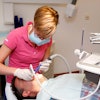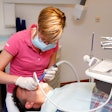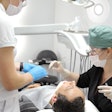Rural areas of Kansas will face a serious shortage of dental professionals in the next three to five years, according to a comprehensive new report on the dental workforce from the Kansas Department of Health and Environment (KDHE).
The Oral Health Assessment for 2009 report is the first step in evidence-based workforce planning and focuses on problems of reach and equity in Kansas' dental workforce, according to the KDHE. The data included in the report will set the stage for future discussions about how Kansas communities can ensure that all Kansans have access to high-quality and affordable oral healthcare.
Among the report's findings:
Frontier and small rural areas of Kansas will face a significant dentist shortage in the next three to five years. This is due to the fact that currently these communities have fewer dentists and many of them plan to retire during this time.
In general, dentists do not make plans to retire as many professionals do in other fields. Among those who have a practice for sale, finding a buyer is challenging. For those who plan to retire, many want to find an associate. In certain areas, those seeking an associate are discovering it difficult to find one.
The current primary care dentist and hygienist workforce do not resemble the population of Kansas racially or ethnically. Research shows that minority patients have better outcomes when they are served by a medical or dental practitioner of their own race/ethnicity.
To address the findings, the report recommends enhancing workforce planning for Kansas by:
- A collaborative, multistakeholder endorsed and sponsored process to collect ongoing oral health professional workforce data
- An effort to better estimate or measure the demand for oral healthcare services (including specialty care) in both rural and urban areas of the state
- The development of a nonaligned, stakeholder-endorsed forum that would serve as a common platform for dental professionals to seek and share information about the oral health of Kansans
Just as the Oral Health Assessment for 2009 was being completed, KDHE's Bureau of Oral Health received word that it would receive $355,153 in federal funding for the first year of a three-year Health Resources Administration Systems (HRSA) grant to create and implement an oral health professional recruitment program, according to KDHE.
"The HRSA grant could not come at a better time for those Kansans that go without access to oral healthcare," said Katherine Weno, director of KDHE's Bureau of Oral Health. "This three-year federal grant will provide funds to allow the Bureau of Oral Health to address the workforce report recommendations by enabling us to provide direct support to Kansas communities who are trying to strengthen their local dental workforce."
In the first year of the grant, the Bureau of Oral Health's activities will include:
- Creation of a dental workforce cabinet
- Oral health professional recruitment assistance for Kansas communities and safety net clinics
- State loan repayment for dental professionals
- Externships for dental and dental hygiene students in underserved areas in Kansas
- Extended care permit outreach for dental hygienists
- Additional research on oral health access in rural communities
For the final two years of the grant, funding will be available for locally initiated recruitment and access projects.
The Bureau of Oral Health worked with its statewide partners, including the University of Kansas Medical Center's Center for Community Health Improvement, the Kansas Dental Association, the Kansas Dental Hygienists' Association, and the Kansas Association for the Medically Underserved, to complete the assessment.
Copyright © 2009 DrBicuspid.com















